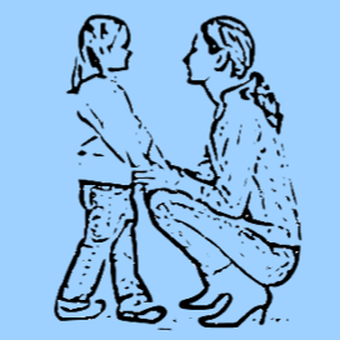 In the past few months, parenting has become exponentially more difficult as the days have gone by. With the onset of COVID-19, our lives became topsy-turvy with school closings and shelter in place orders. Then came more losses, whether in the form of cancellations of graduations, events, and many camps; employment; or as the loss of a loved one, friend, or acquaintance. More recently, the lifting of some restrictions has brought about mixed feelings and even anxiety about re-entry. In addition to the stressors brought forth by COVID-19, we have also witnessed atrocious acts of racial injustice. Any one of these happenings would test our coping skills but taken together they have left many of us feeling overwhelmed. As parents and caretakers, we face an even greater challenge. How do we address these events and changes with our children? How do we have the difficult conversations? Below, we offer some general tips, as well as some topic-specific resources that you may find helpful in framing your own thoughts in preparation for having these talks with your children. Prioritize your child’s emotional well-being As adults, we must acknowledge and deal with our own discomfort with difficult topics, yet still be willing to talk to our children about it. By avoiding the topic altogether, we may inadvertently signal that the topic is too scary to address, thereby increasing their anxiety. Prepare for the talk by examining your own thoughts and biases and try to anticipate questions that your children might have and prepare to answer them by exploring resources. Try out the talk and bounce ideas off another trusted adult before approaching your child. Seize the moment Use comments your child has made, or that your child has heard (intentionally or inadvertently) as a catalyst for the conversation. Ask them what they already know about the topic and go from there. If an opportunity does not arise naturally, consider using a book or other age appropriate media as a catalyst for the conversation (see the resource section below for child-appropriate books and media links).1 Use direct, concrete, age-appropriate language Euphemisms and metaphors can be confusing and scary, especially for young children. For example, when speaking to a grieving child, use concrete words like died or death instead of went to sleep or passed away. Model appropriate emotional responses Do not be afraid to allow your child to see that you are sad, angry, or disappointed. Be truthful, talk to them about how you are feeling, and show them how to manage these emotions in a healthy way. If you are struggling with these emotions yourself, reach out and ask for help from your clergy, your Kesher worker, or a mental health professional. Avoidance does not indicate a lack of understanding Children do not process in a linear fashion. Talking about it and then seeming to ignore the subject does not mean that they did not understand. They might be on information overload. Give them time and space to process their thoughts and emotions. It is not a one and done Children might then bring up the topic at random times. If they do not, do not assume they no longer want or need to talk about it. Check back in and invite them to readdress it with you.2 It is okay to not have all the answers There is no one right way to have these difficult conversations. Do not fear messing up. Be comfortable with saying, “I don’t know,” or “I have to think about that, and we can talk about it some more later.” Trust your gut instinct and follow your child’s lead to determine how much information they can handle and process. Above all else, listen to them, validate their feelings, and be there for them. Each family is unique and dealing with challenges in their own way. If you would like someone to help process and provide further guidance specific to your situation, please reach out to your Kesher worker. I am available by phone at 401-428-4084 or by email at [email protected]. Are you interested in learning more about how to help children navigate the grieving process? Please join me on Zoom, Thursday, July 9 at 8 p.m. as my Kesher colleague, Tara Watkins LICSW, facilitates a talk with guest speaker Ryan Loiselle LICSW, Program Director of Friend’s Way (Rhode Island’s only children’s bereavement center), on ways to help children and their families cope with grief and loss during COVID, the re-entry process, and beyond. ---------------- 1 Turner Ph.D., Erlanger A. (Aug. 13, 2017). "Race in America: Tips on Talking with Children About Racism." 2 Koslowitz Ph.D., Robyn. (Apr. 24, 2020). "Scared to Death to Talk to Your Kids About Death?" 3 Katherine Nguyen Williams Ph.D. (Jan. 27, 2020). "Telling Your Child or Teen About Kobe Bryant's Death." ---------------- Resources This list is by no means exhaustive, and we know that not every article with resonate with every family. If you need assistance locating additional resources, please reach out to Shana at [email protected] or 401-428-4084. Grief and Loss https://www.psychologytoday.com/us/blog/babies/202005/talking-young-children-about-death https://www.psychologytoday.com/us/blog/two-takes-depression/201612/the-dos-and-donts-talking-child-about-death https://www.psychologytoday.com/us/blog/going-beyond-intelligence/201708/mindful-meditation-the-mysteries-life-children (book recommendation with imbedded link to additional book recommendations) https://www.psychologytoday.com/us/blog/the-modern-child/202001/telling-your-child-or-teen-about-kobe-bryants-death (information about talking to teens about death, with information on access to social media and how it affects coping) https://www.kveller.com/camp-kveller-will-help-with-all-your-questions-and-concerns-about-jewish-summer-camp/ (camp closures) Racism https://www.pbs.org/parents/thrive/how-to-talk-honestly-with-children-about-racism https://www.npr.org/2020/06/03/869071246/how-white-parents-can-talk-to-their-kids-about-race https://www.kveller.com/what-to-say-and-read-to-your-children-right-now-about-race/ https://www.psychologytoday.com/us/blog/diverse-development/202006/the-dangers-colorblind-socialization https://www.psychologytoday.com/us/blog/the-race-good-health/201708/race-in-america-tips-talking-children-about-racism https://www.kveller.com/a-jewish-anti-racist-reading-list-for-children-of-all-ages/ (book recommendations) https://www.nytimes.com/2020/06/03/parenting/kids-books-racism.html (book recommendations) Re-entry anxiety https://www.today.com/health/how-deal-anxiety-around-re-entry-during-covid-19-crisis-t182743 Talking to Teens https://childmind.org/article/teenagers-and-reopening/ https://www.screenagersmovie.com/tech-talk-tuesdays/our-kids-need-us Comments are closed.
|
Samantha ClarkSamantha Clark is part of the Kesher Worker team at Temple Sinai. Kesher is the congregational outreach program of Jewish Collaborative Services of Rhode Island, funded by the Jewish Alliance of Greater Rhode Island and private donors. Katie can be reached at 401.415.8213 or by emailing Archives
April 2021
Categories |

Affiliated with the Union for Reform Judaism
30 Hagen Avenue • Cranston, RI 02920 • 401-942-8350 Office: dottie@templesinairi.org Rabbi Jeffrey Goldwasser: [email protected] |
Want to sign up for the weekly Sinai Scroll email?
Click here to receive weekly updates on Temple services, events and a message from the Rabbi. |


 RSS Feed
RSS Feed

